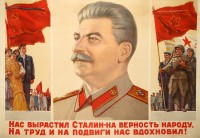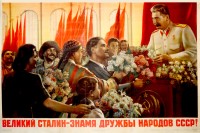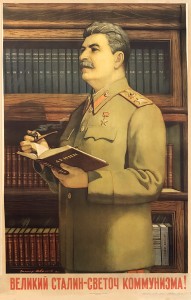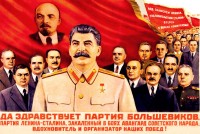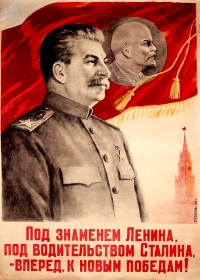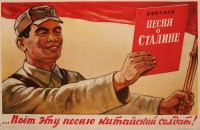Stalin
Stalin was born Ioseb Jughashvili in 1878 in Gori, Georgia, a multicultural borderland of the Russian Empire nestled in the Caucasus Mountains. From a humble family, the young Stalin found his way in the world through education, first in the local church school and then a seminary in the bustling city of Tbilisi. Instead of entering the priesthood, however, he got involved in radical politics. Leaving the seminary in 1899, he organized strikes, evaded the police, and planned bank robberies. [Text continues at bottom of page]

When the Russian Social-Democratic Workers Party split, Jughashvili chose the Bolsheviks over the Mensheviks, who had a majority in the Caucasus. He survived in the underground year after year, but also spent considerable time under arrest, in exile, and escaping from distant corners of the empire. His actions gained the notice of Lenin and other leaders, but because he spent most of these years underground, far from their European exile, he remained a relatively insignificant member of the Bolshevik faction. By 1912, however, he first used the nom de guerre Stalin, from the Russian for "steel," and became editor of the Bolshevik newspaper and a member of the faction's Central Committee. He also completed his only significant prerevolutionary writing, an essay about the empire's non--Russian nationalities.
Receiving word of the February revolution, Stalin and his fellow revolutionaries immediately departed their Siberian exile for Petrograd. There, as part of Lenin's close circle and a Central Committee member, he participated---albeit largely behind the scenes---in events leading to the October Revolution. In the initial Council of People's Commissars, Stalin became Commissar of Nationalities because his non--Russian background gave him advantages in the important task of recruiting non--Russian nationalities to the revolutionary cause. Soon, he became a party overseer of Red Army operations, a capacity in which he stood out for his excessive aggression in military strategy and zealous prosecution of purported counterrevolutionaries. These facts, capped by battlefield failures, first brought him into conflict with Leon Trotsky. At the close of the Russian Civil War in 1922, Stalin became General Secretary of the Communist Party, an office future rivals initially dismissed as a mere bureaucratic post. Exploiting its authority over personal, Stalin built up patronage networks of loyal party and government functionaries. Stalin's complex relationship with Lenin came to a head at the end of the latter's life, when in 1922 they clashed over the legal framework for Soviet Russia's relations to non--Russian borderlands to be incorporated into the new Soviet Union. When Lenin died in 1924, Stalin overcame Lenin's aspersions and cast himself as the leader's most loyal disciple and interpreter. In the fierce intraparty struggles of the 1920s, Stalin combined the prestige so gained with patronage and skillful maneuvering to defeat Trotsky and all other rivals. First among equals by 1928, Stalin became the unquestioned leader of the country.
For twenty-five years, Stalin towered above politics, life, and propaganda unlike any other figure. The cult of Stalin required that all achievements---from scientific discoveries to happy childhoods---be attributed to the Leader's guidance and inspiration. The industrialization forced during the pre--World War II five-year plans burnished Stalin's image, while discussion of accompanying famine, repression, and turmoil was ruthlessly repressed. Stalin reinforced his power using the secret police, over which he retained close control. His own suspicions, fueled by police reports about suspected counter-revolutionaries, transformed a resolutely repressive system of prisons and forced labor into one that, by 1936, became lethal on an unprecedented scale. Stalin routinely feared internal and external threats, including the rise of fascism in Europe, and he tasked the secret police with eliminating entire categories of supposed enemies. Lasting until Stalin called a halt in 1938, the Great Terror consigned at least 700,000 to summary execution and millions more to hard labor, including wives and children of the condemned.
When war with Germany finally came in 1941, the Soviet Union nonetheless proved unprepared. Stalin's strategic choices, dating at least to the ill-fated 1939 non-aggression pact with Hitler, made the German surprise attack possible. Stalin's orders to counterattack at any price and to treat tactical retreat as cowardice resulted in millions of Red Army dead and captured. Only in 1942 and 1943 did Stalin allow commanders the flexibility to employ strategies permitting the Red Army to fight effectively. Stalin remained the final arbiter of military and economic strategy, however, while conducting foreign policy virtually autonomously. Most visibly, Stalin remained a symbol in propaganda for the country and its war effort, an oddity in light of his thick Georgian accent and unimposing physical appearance in real life. Although mistrusted by his wartime allies, Stalin reached the height of his global influence. Imposing control over conquered territories of Europe and, after 1949, navigating a close but fraught relation with Mao Tse-tung, the Soviet leader influenced the lives of one-third of humanity. In 1945, Stalin reversed the wartime expedient of relaxing his control over people and decision-making, re-imposing harsh discipline to gird state and society for the looming Cold War struggle. He surrounded himself with handpicked underlings, each of whom owed everything to him and could be---and sometimes were---eliminated at any moment. Repression continued, including against prominent cultural and political figures. Only Stalin's physical decline hinted that change might someday come. After the war, Stalin spent increasingly lengthy periods recuperating in his villa on the Black Sea coast. Age and health finally caught up to him in March 1953, when he died of a stroke. At the time, everyone, even those who had suffered under his rule, feared what a future might bring without the Great Leader who had led them through industrialization and war.
Suggested Reading and Resources:
Oleg Khlevniuk, Stalin: New Biography of a Dictator, trans. Nora S. Favorov (Yale University Press, 2015).
Stephen Kotkin, Stalin, vol. 1, Paradoxes of Power, 1878--1928 (Penguin, 2014).
Stephen Kotkin, Stalin, vol. 2, Waiting for Hitler, 1929--1941 (Penguin, 2017).
Stephen Kotkin, Stalin, vol. 3 (Penguin, Forthcoming).
Library of Congress, "Revelations from the Russian Archives,"https://www.loc.gov/exhibits/archives/intn.html
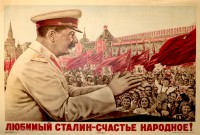
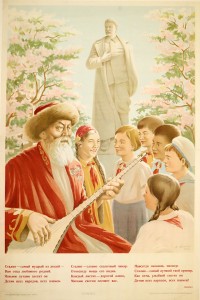
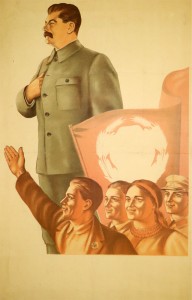
![PP 059: [Stalin wrote] “The victory of Socialism in our country is accomplished! The base of the socialist economy is completed.”
[Partial translation]](https://www.posterplakat.com/thumbs/the-collection/posters/pp-059/pp059-200x300.jpg)
![PP 063: [Pending translation (Без Перевода)]](https://www.posterplakat.com/thumbs/the-collection/posters/pp-063/pp063-200x134.jpg)
![PP 064: [Pending translation (Без Перевода)]](https://www.posterplakat.com/thumbs/the-collection/posters/pp-064/pp064-200x109.jpg)
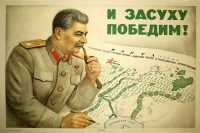
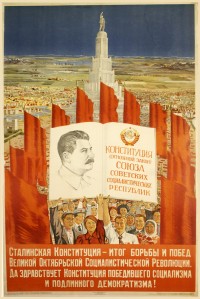
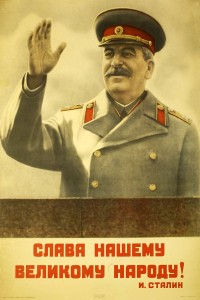
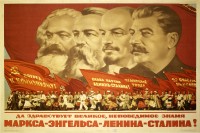
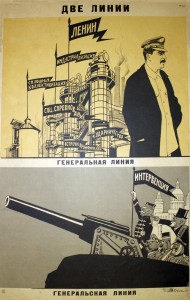
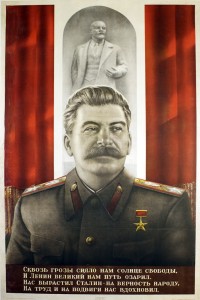
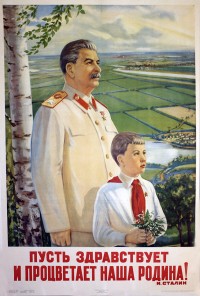
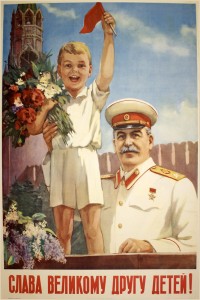
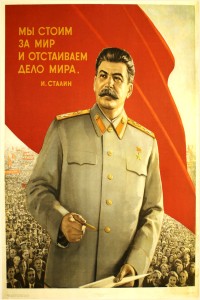
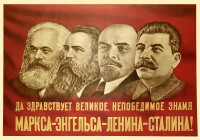
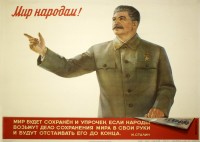
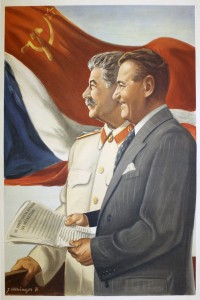
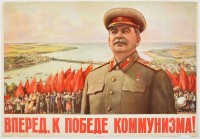
![PP 158: Forward to new victories under the flag of the great party of Lenin-Stalin!
[Partial translation]](https://www.posterplakat.com/thumbs/the-collection/posters/pp-158/pp158-200x300.jpg)
![PP 160: Our first Candidate for deputy in the Supreme Soviet of the Uzbek Soviet Socialist Republic - Joseph Vissarionovich Stalin.
Stalin election district number 38 in Tashkent [Uzbekistan]](https://www.posterplakat.com/thumbs/the-collection/posters/pp-160/pp160-196x300.jpg)
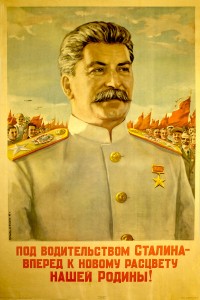
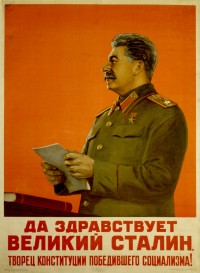
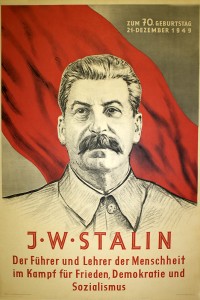
![PP 202: Long live the All-Russia [Bolshevik] Communist Party! The party of Lenin-Stalin, the avant-garde of the soviet people tempered in battle. The inspirer and organizer of our victories!](https://www.posterplakat.com/thumbs/the-collection/posters/pp-202/pp202-200x300.jpg)
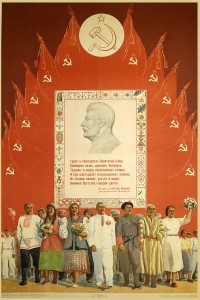
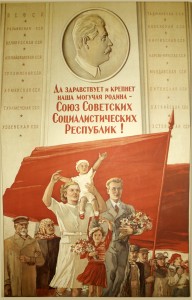
![PP 206: The United Socialist Party of Germany welcomes their great teacher of the All-Russia Bolshevik Communist Party of the Soviet Union to the 19th party day of brotherly discussion of [their mutual] struggle](https://www.posterplakat.com/thumbs/the-collection/posters/pp-206/pp206-200x284.jpg)
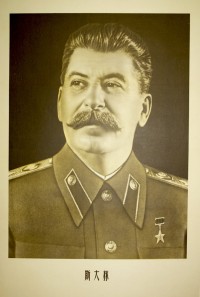
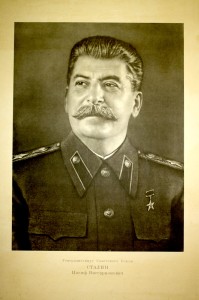
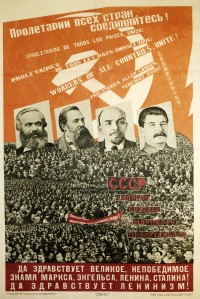
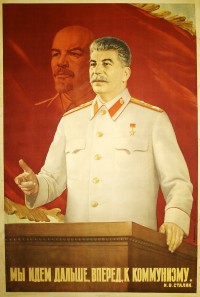
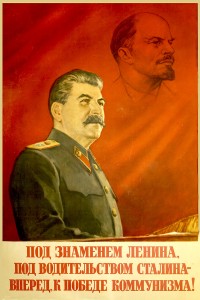
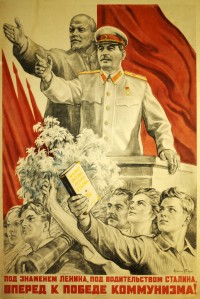
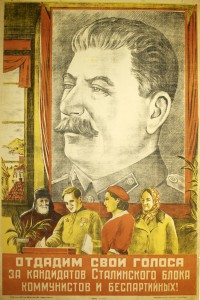
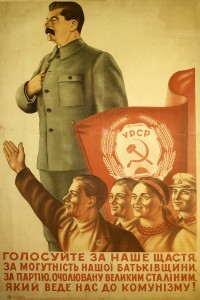
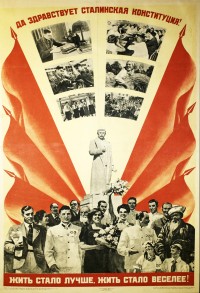
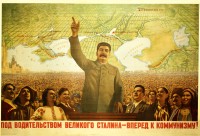
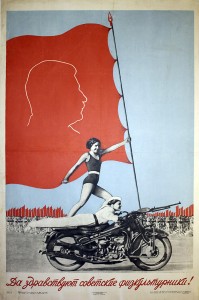
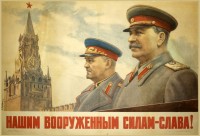
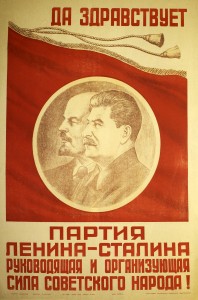
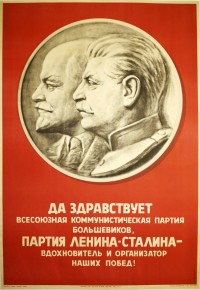
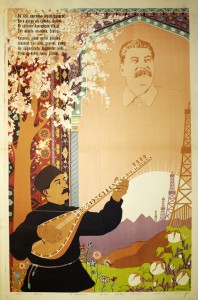
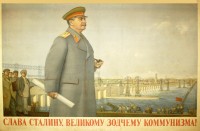
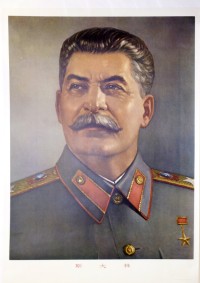
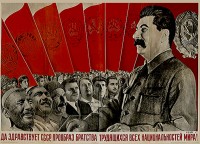
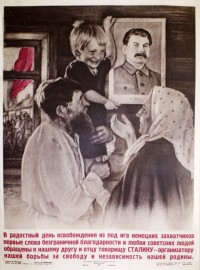
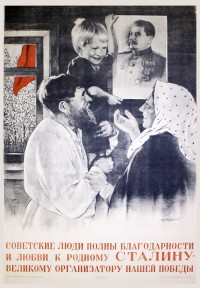
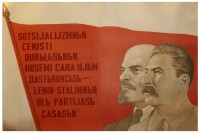
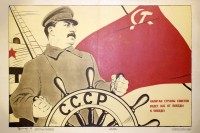
![PP 439: [At top]](https://www.posterplakat.com/thumbs/the-collection/posters/pp-439/pp439-200x172.jpg)
![PP 452: The reality of our program is real people. It is we who are with you. --Stalin.
[Partial translation]](https://www.posterplakat.com/thumbs/the-collection/posters/pp-452/pp452-200x282.jpg)
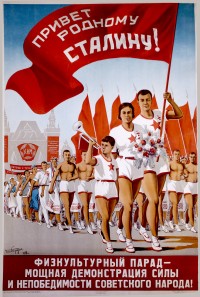
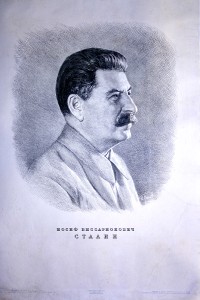
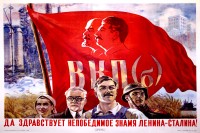
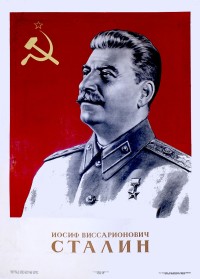
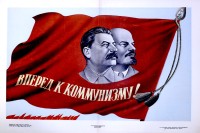
![PP 580: Comrades Red Army Soldiers and Red Navy Sailors, Commanders and Political Operators, Men and Women Partisans!
The whole world is looking at you as a force able to totally destroy the pillaging hordes of [the] German aggressor.
-J. Stalin](https://www.posterplakat.com/thumbs/the-collection/posters/pp-580/pp580-200x300.jpg)
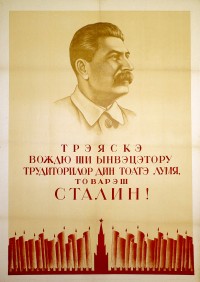
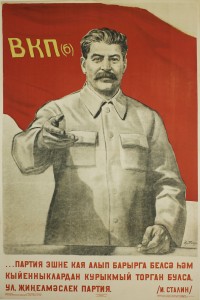
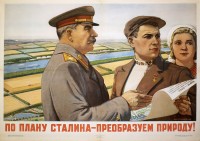
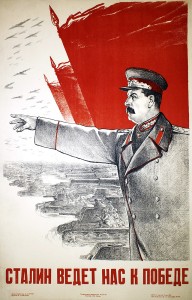
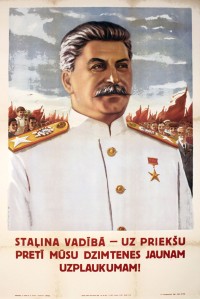
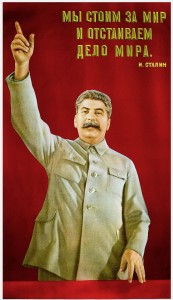
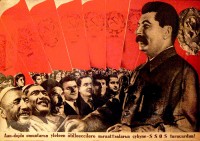
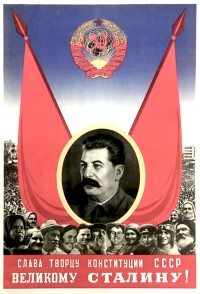
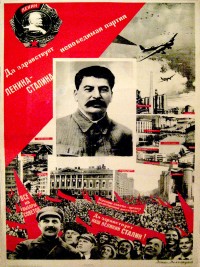
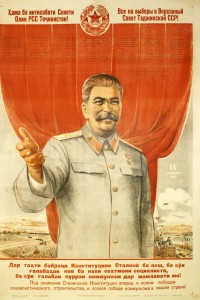
![PP 712: Long live the VKP(b) [All-Union Communist Party (bolsheviks)] - the avant-garde of the workers of the Soviet Union!](https://www.posterplakat.com/thumbs/the-collection/posters/pp-712/pp712-200x284.jpg)
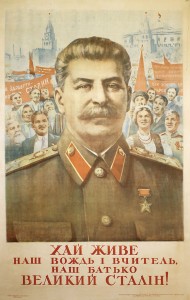
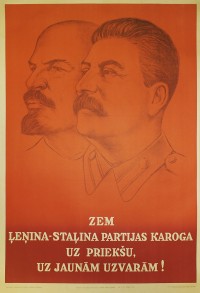
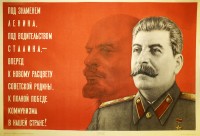
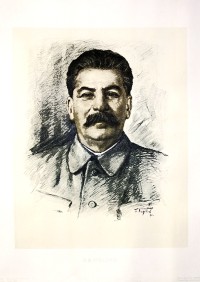
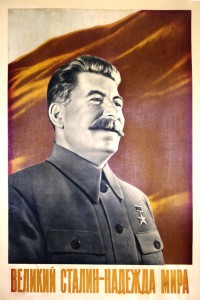
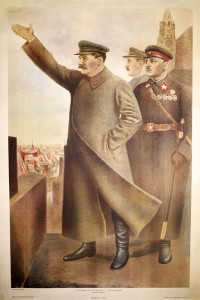
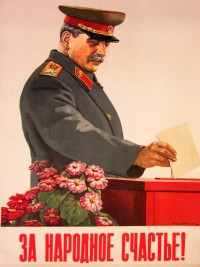
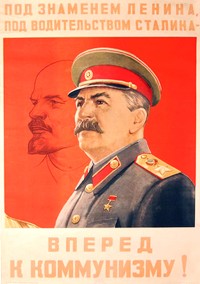
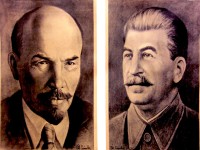
![PP 826: Peace will be maintained and will last if the nations [people] take into their hands the issue of the preservation of peace and persist with it throughout. - J.V Stalin](https://www.posterplakat.com/thumbs/the-collection/posters/pp-826/pp-826-catalog-image-200x273.jpg)
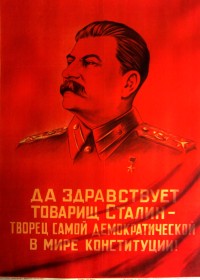
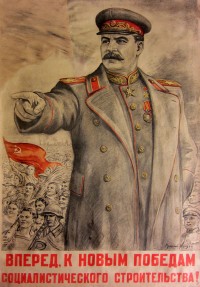
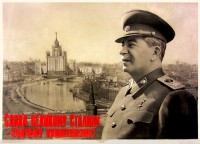
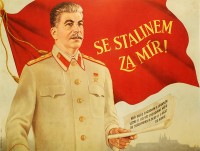
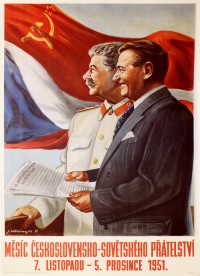
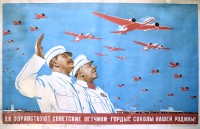
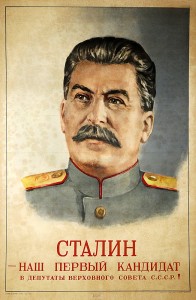
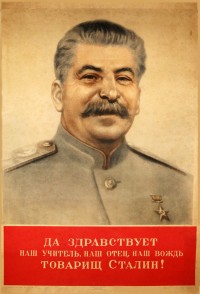
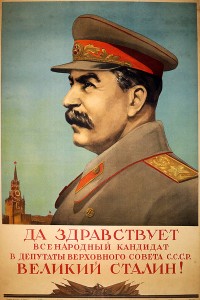
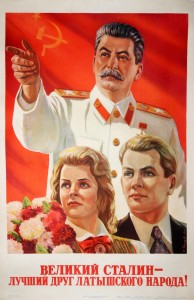
![PP 966: [Pending translation (Без Перевода)]](https://www.posterplakat.com/thumbs/the-collection/posters/pp-966/pp-966-catalog-image-200x293.jpg)
